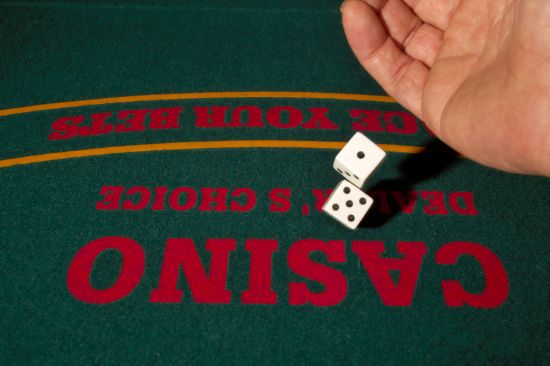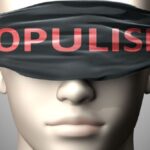In the game called craps, a player is given two dice to roll while others place bets on the outcome. Roll a 7 or 11 and the players win. Roll a 2, 3, or 12 and all players lose. Other combinations are referred to as points. The player throwing the dice who rolls a 4, 5, 6, 8, 9 or 10 must repeat the same number followed by a 7 to win. Roll a 7 before the point combination and the thrower loses. There are other betting options but needless to say, players in the game of craps are counting on the random roll of dice to give them a return on their investment.
It should be understood by any player of craps or other games of chance that the odds generally favour the casino host. Craps, however, compared to Blackjack, Baccarat, Video Poker, Roulette, or Slot Machines, do give players a better chance of not losing. Blackjack would be next. If you frequent casinos or virtual ones, avoid roulette, video poker and the slots. These games of chance are where the house cleans up.
So why on this science and technology blog am I talking about craps and casino games? The answer is this:
People, their governments and many businesses, the latter particularly involving those in the fossil fuel industry, are hoping to play craps rather than putting in the time, work and money needed to create a better environmental outcome than what we are drifting towards today.
Governments Fuel Gambling
Governments are in the gambling business these days. Bookies, those grey characters that sold my father Irish Sweepstakes tickets back in the day, and that placed bets on the horses and sports, are now government-licensed. You can’t watch sporting events today without being bombarded by odds and betting lines with the fine print asking us to act responsibly and know our risk limits. The sponsoring sites are often licensed or owned by government.
Contributing to gambling addiction are the high-tech companies that have built media and devices that encourage people to stay fixed on small screens where they get bombarded with ways to play and win requiring no more effort than tapping a link.
Gambling on the future is much more than just a distraction or an opioid. It is a formula for failure and we are witnessing this globally in real time.
How are we complicit? The evidence lies around us.
- Human activity is destroying the environment. We continue to pollute the skies, cut down the forests irresponsibly, and dump plastic and other waste into freshwater and the oceans. These activities are the principal cause of an ongoing mass extinction event with ecosystems disrupted and biodiversity reduced.
- The pollution we produce, today, causes 9 million excess human deaths annually attributed to respiratory, heart, stroke, cancer and diseases primarily linked to environmental degradation.
- Our reliance on burning fossil fuels in power plants, ships, airplanes, trucks and cars contributes to the greenhouse gasses responsible for global warming and increasing extreme weather events.
- By extracting more natural resources from the planet than it can sustain we are consuming more than the sum of two Earths combined leading to all kinds of growing scarcities including that for freshwater and food.
The impact of this destructive behaviour largely paid lip service to by governments, and ignored by companies profiting from complicit behaviour is creating future generations with rising anxiety, diminished hope and despair. Nothing good can come from a decline in our mental well-being.
Not to fear, however, there is always gambling to distract us from reality. Back in the days of the Roman Empire, it was bread and circuses that the emperors of the day used to beguile the crowds. For my parents, it was the Irish Sweepstakes tickets that filled an oriental jar on our living room coffee table, not one ever paying out a cent. The current equivalent is government-sponsored games of chance.
Here in Ontario, where I live:
- It is more important for the government to put beer and alcohol in corner stores (another form of addiction) than deliver ecologically and environmentally sound policies and programs that speed up mass transit builds, reduce people’s reliance on cars, and restore the environment.
- It is better to create more lotteries and ways to gamble to hook people into throwing away more of their money where the odds favour the house.
- It is better to cancel renewable energy solar and wind projects and instead build polluting gas-fired thermal power plants that contribute more greenhouse gasses to a warming atmosphere let alone cause increases in respiratory diseases in the population.
Fossil Fuel Companies Hose The Public
Meanwhile, here in Canada fossil fuel companies regale us with television advertising telling us without them the lights would dim and our way of life would be severely altered.
These ads are paid for by the same companies that are asking the government for billions of dollars to support their Pathways Alliance Project which if they were to act in the best interests of the planet could be paid from the profits they earn.
These are the same companies that scream when governments announce intentions to reduce or remove billions in subsidies given to the industry to enable them to continue to extract and produce the very stuff that is poisoning our air, and environment and contributing to climate change.
Being Hosed by Government and Fossil Fuel Companies
If this doesn’t tell you we collectively are being hosed by governments and the energy industry then I don’t know what will. Playing craps or even worse roulette seems to be the answer we are being fed by those with power and influence. It appears that tackling the formidable problems we face is too much for them to handle. It is bread and circuses all over again until Rome burns.









